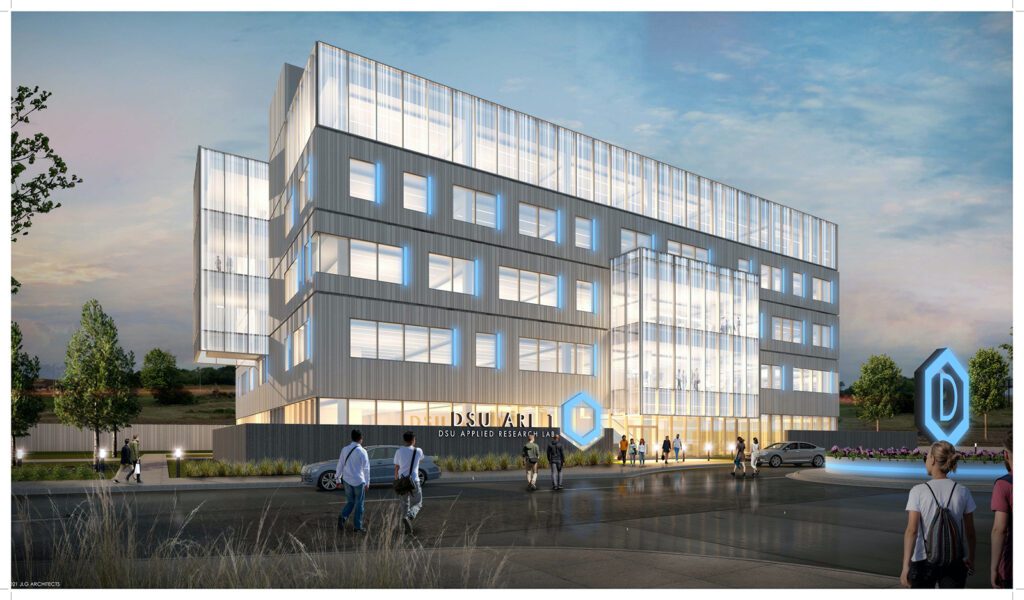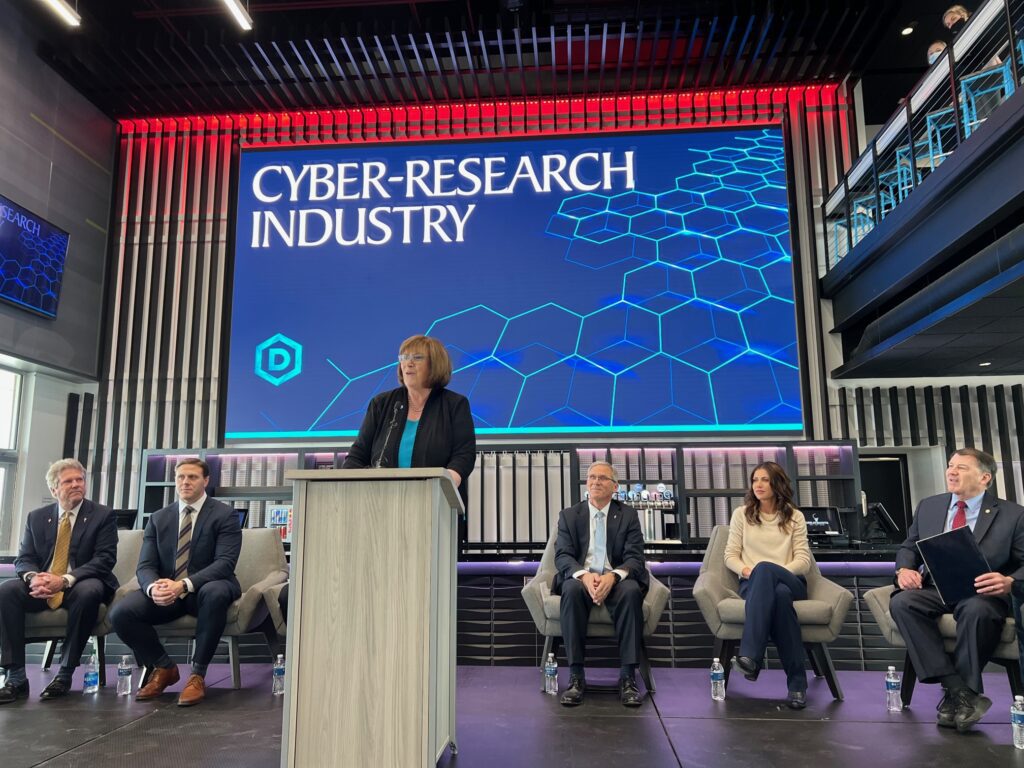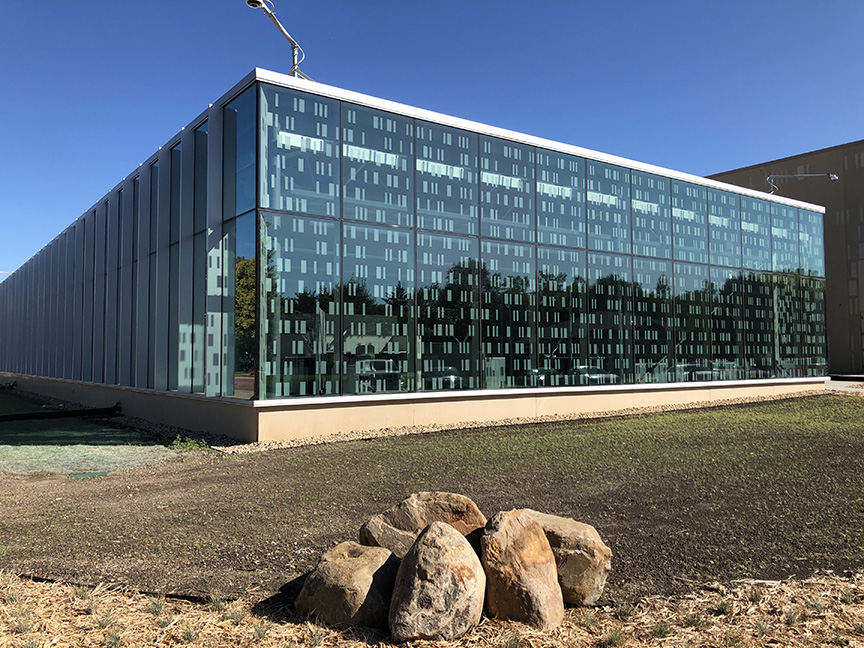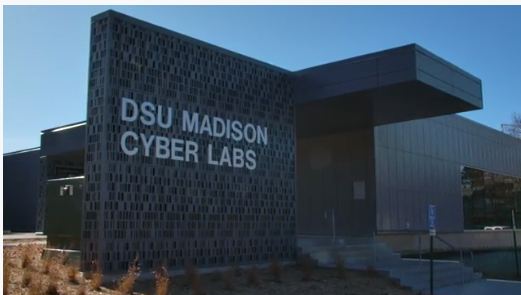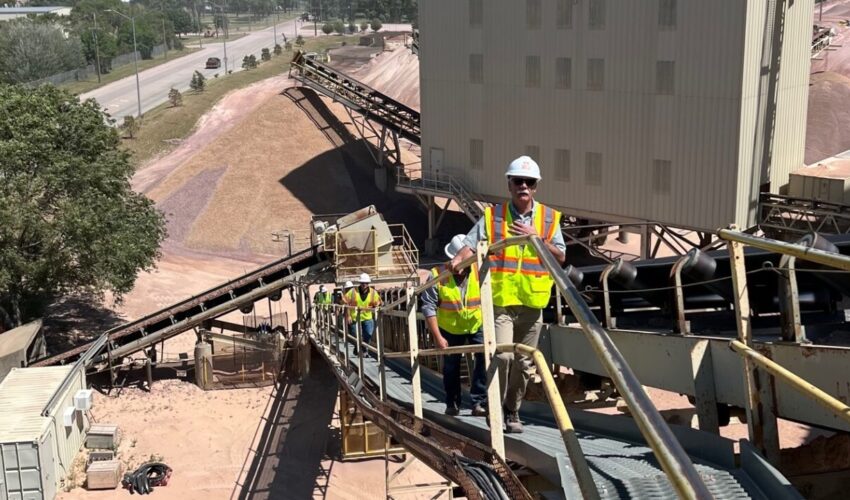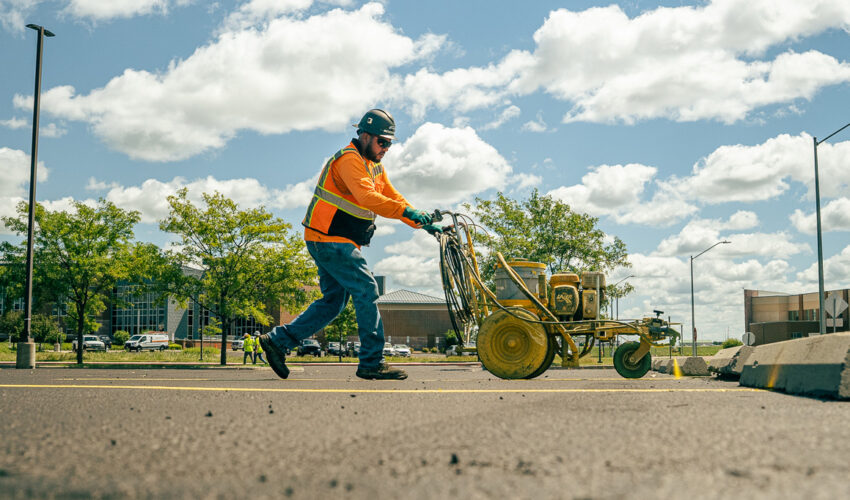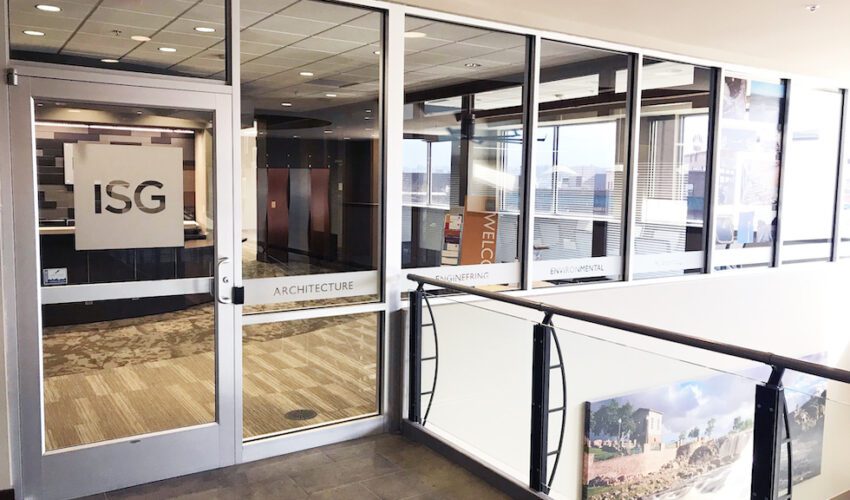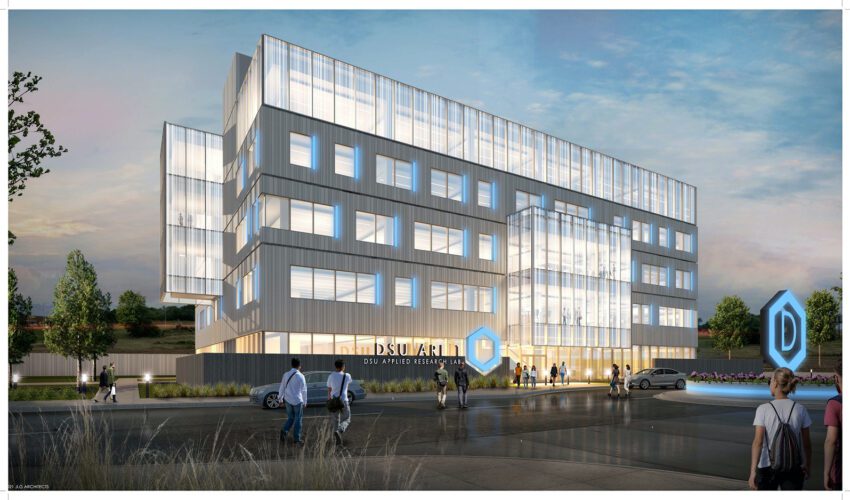DSU plans significant cyber research center in Sioux Falls
Jan. 26, 2022
Dakota State University is planning a cybersecurity research center in Sioux Falls estimated to bring at least 400 six-figure-paying jobs and $100 million in annual economic activity.
The building, a $50 million project funded with a donation by Denny Sanford, will be located at the Sanford Sports Complex near Sanford Health’s future Virtual Care Center.
Rendering by JLG.
“It’s big,” DSU president José-Marie Griffiths said. “If you look at where cybersecurity activity occurs in the U.S., it’s on the coasts. And there’s nothing in the middle. It’s a simple opportunity. The vision became maybe South Dakota can become a ‘cyber state’ operating in the middle of the country. Maybe we could provide service from here.”
Bringing the vision together has taken years as partners from state and local government, the business community, higher education and philanthropist Sanford came together.
The overall initiative, estimated at $90 million, also includes a donation of up to 16 acres from Sanford Health.
Of the total, $30 million over five years will require approval from the South Dakota Legislature and is directed not to Sioux Falls but to Madison, where DSU seeks to double the number of graduates from The Beacom College of Computer & Cyber Sciences.
“DSU Madison is the engine that drives this whole development,” Griffiths said. “We can’t generate any more graduates because our faculty are overloaded as it is.”
Producing more graduates in cyber programs also requires expanding capacity at the College of Arts & Sciences, where those students take many of their general education courses, she added.
Of the total, $10 million is designated to come from the city of Sioux Falls to support infrastructure to the new research building site, and $250,000 is allocated from the Forward Sioux Falls economic development partnership over five years.
The Dakota State University Applied Research Lab, or ARL, is designed as a 100,000-square-foot building that will be highly specialized and built to the specifications required to capitalize on the full extent of cyber research opportunities.
“It’s not a traditional construction project,” Griffiths said. “We lose a number of our graduates to the specialized facilities that exist because they have to go there to do the work, and now they have a facility where it can be done.”
Facilities that perform work that supports national security and defense require special accreditation, and the level of work done at DSU requires separate clearance for the university itself – one that can be used within 50 miles of Madison.
The Madison Cyber Labs, which opened in 2019, have begun to draw interest from businesses in contracting for work, and an attached applied research lab also is gaining momentum after a pandemic-related opening delay, Griffiths said.
“Sioux Falls became a natural location for us to look at,” Griffiths said. “We need to build a new building in Sioux Falls that’s much larger than our lab here.”
The DSU ARL would be a state-owned facility, but those who work there would not be state employees, Griffiths said. A separate nonprofit will be formed and serve as a contractor with those needing cyber research work – everyone from government contractors to private businesses. Entities potentially could lease space and employ people within the lab or contract directly with the nonprofit to provide those services.
Think Google, Microsoft, Amazon. Those types of businesses are all potential users or clients of a facility like this.
“They’re very interested in the specialized facility that we have because they also work in those areas, and there aren’t many facilities of this kind,” Griffiths said.
The initial estimate calls for 400 to 500 jobs associated with the center, bringing $100,000-plus salaries, but that’s likely a minimum, said Miles Beacom, a DSU graduate and namesake of the college that will train the graduates.
“It’s just an amazing opportunity for South Dakota,” he said. “We’re keeping these superstars as far as graduates here in Sioux Falls, where in the past they’ve had to move to D.C. where the jobs were.”
Denny Sanford was drawn to support the benefits of keeping cyber experts in the state, said Beacom, CEO of Premier Bankcard, which Sanford founded and owns.
“These will bring in other jobs as well, and people will be competing for these individuals,” Beacom said. “I could see expansion in the future and businesses moving into South Dakota. These are going to be incredibly competitive jobs.”
Griffiths’ relationships run deep in this field, he added.
“These jobs are going to be truly because of the seeds she’s planted,” he said. “When you look at the partnerships between the contractors working for the government in D.C., and there’s going to be business relationships all tied together within this lab.”
Potential partners are reaching out constantly, Griffiths said.
“Every day, we have people visiting,” she said. “The demand is significant. Just last week, the number of unfilled cyber jobs in the U.S. was 402,000. The total number of jobs is accelerating in growth.”
City government proposes to support the project through a $10 million contribution largely dedicated to infrastructure to the site, Mayor Paul TenHaken said.
“Five hundred $100,000 jobs at scale is just an incredible addition to the economy,” he said. “I’m so excited to finally lift the curtain on this thing. It just took the right people for this all to come together.”
The city’s commitment will include some programmatic support and doesn’t count additional road expansions that likely will be needed as the center and surrounding area grows, he said. It will depend on City Council approval.
“We’re in a spot right now where we can aggressively fund this on the front end,” TenHaken said, pointing to the city’s robust sales tax collection last year and subsequent fund balance.
“The hope is this really starts to grow and that it serves as a cyber incubator. The folks that will work in the cyber incubator park won’t work there forever. They’ll start cyber startups that will stay in our community. We’re planning this in such a way that there’s going to be a campus out there and not just a singular building.”
There’s enough land for up to three such buildings, Griffiths said.
“If we have the workforce available and we have the lifestyle people want, and you have Sioux Falls, which is a great place for young professionals and a great place to raise families, I just think it has a lot going for it,” she said. “This is part of an even bigger package … and I just think the opportunity is huge.”
Site work for the building is planned to start this spring, assuming approvals by the Legislature and City Council, meaning the building would be ready by the fall of 2025.

